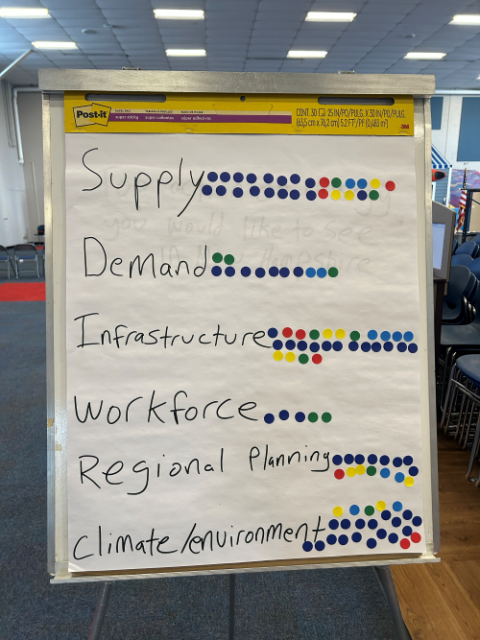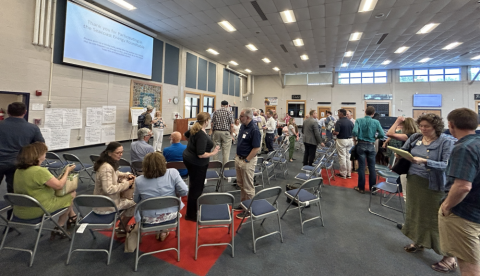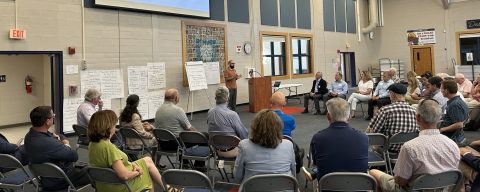Seacoast Energy Roundtable hosts discussion of energy challenges and solutions
New Hampshire is grappling with energy challenges ranging from affordability and reliable supply to climate change and building a trained workforce to build and maintain critical infrastructure. In parallel, residents, businesses, and towns are navigating affordability and reliability obstacles, and planning for an uncertain future. But there’s only so much they can do on their own, so it should have been no surprise there was significant interest and energy in coming together to wrestle with these issues, and find common cause, away from the heated halls of the NH State House.
On July 20, a group of stakeholders and policy makers, primarily from within New Hampshire Senate District 241, convened at Winnacunnet High School in Hampton for a conversation that explored attendees’ experiences with energy and crafting a vision for New Hampshire’s energy future with a path to get there. The conversation was designed for participants to make valuable connections, share experiences and hear the stories of others navigating New Hampshire’s energy landscape. It was also an opportunity to stimulate a constructive dialogue to frame energy challenges and share ideas for addressing them. A sizeable contingent of elected officials and policy makers were in the room, and they had an opportunity to hear perspectives distinct from what they may hear in Concord.
BACKGROUND
According to the US Energy Information Administration, New Hampshire has the highest average cost of electricity in Northern New England, with the third highest residential costs and second highest business costs in all of New England. New Hampshire’s energy prices are the fifth highest in the continental United States, and every New England state is in the top ten of highest electricity prices. New Hampshire’s energy supply includes approximately 56% nuclear energy, 25% natural gas, 7% hydropower, 6% biomass, 3% wind, 1.6% coal and 1% solar.

KEY CONCERNS
Framing the conversation, participants identified energy supply, infrastructure, and the impact of the energy decisions we make on the environment/climate as areas of most concern with regional planning, energy demand, and workforce development issues of lesser relative importance.
TAKEAWAYS
Deliver Cost-Effective and Reliable Energy While Also Increasing the Supply of Renewables
Participants emphasized the importance of increasing renewable energy and identified opportunities for state policies to incentivize transition to a higher proportion of renewable energy resources. Participants widely noted that the cost of renewable energy, like solar, continues to come down, yet there was at times tension between prioritizing resource diversity and cost-effective energy with leveraging state policy to incentivize increased development of renewable energy resources. Exploring opportunities for state policy to incentivize supply of renewable, or clean energy, while also delivering cost-effective and reliable energy to residential and business users, will be important moving forward.
Upgrade and Enhance Grid Resiliency
Participants identified infrastructure as the second most important issue. In discussing the future of energy in New Hampshire, participants flagged key themes such as resiliency, reducing outages, distributed energy resources, and identification and accounting of energy generation. Expanding on some of these themes in breakout discussions, participants brought up cost-effective energy efficiency upgrades, potential challenges with transportation infrastructure associated with anticipated reduced gas tax revenue, electrical grid resiliency (to threats including extreme weather and cyber-attacks), expanding electric vehicle charging networks, and grid modernization to accommodate increased electrification.
State and Local Government Have Important Roles to Play
Another theme that emerged was how politics at the state level is a challenge to overcome. Conversely, participants talked about how there is opportunity for municipalities to take action, including exploring community power aggregation and solar tax-credit incentives, reforming local ordinances, and increasing community engagement. Yet there were people in the room who shared their perspectives on barriers for municipalities and other entities to research, evaluate and apply for grants, as well as navigate the complexity of some issues and opportunities.
Several participants expressed dissatisfaction with the current New Hampshire 10-Year Energy Strategy. The document was last updated by the NH Department of Energy in July, 2022. It “identifies major energy policy goals to establish a framework for pursuing policy mechanisms.” Those goals are as follows:
-
Prioritize cost-effective energy policies.
-
Ensure a secure, reliable, and resilient energy system.
-
Adopt all-resource energy strategies and minimize government barriers to innovation.
-
Achieve cost-effective energy savings.
-
Achieve environmental protection that is cost-effective and enables economic growth.
-
Government intervention in energy markets should be limited, justifiable, and technology neutral.
-
Support a robust, market-selection of cost-effective energy resources.
-
Generate in-state economic activity without reliance on permanent subsidization of energy.
-
Protect New Hampshire’s interests in regional energy matters.
-
Ensure that appropriate energy infrastructure is able to be sited while incorporating input and guidance from stakeholders.
Some of the participants in the roundtable expressed frustration with the document’s neutrality on energy sources. Others challenged the document because they thought it didn’t have more clearly defined goals. Along those same lines, some participants thought there was a need for more of a plan, or roadmap, to guide how New Hampshire approaches energy challenges and opportunities.
Public Education and Messaging are Critical
The need for more effective and facts-based public messaging and education was expressed by many different stakeholders, from utilities to elected officials to nonprofits and more. Some emphasized the need for members of the public to better understand the complexities of how energy is created, transmitted, and used. Others focused on climate change and how the over-politicization of that issue has hindered efforts to address the challenges – and opportunities – it presents.
One participant mentioned how important it is that we do not get “hyper-focused” on one particular and relatively small issue – electric vehicles for instance – and lose sight of much bigger issues – for example, transitioning to a less carbon intensive economy.

Collaboration is Invaluable
Constructive dialogue and engagement is critical for navigating challenging issues like the future of energy in New Hampshire. The group of stakeholders in attendance were enthusiastic, thoughtful, respectful of different perspectives, and willing to share and listen to personal experiences. When people come together and talk about their personal experiences with an issue, that can lead to finding common ground and identifying tangible solutions to real challenges. Some of the personal experiences participants shared were:
-
One car dealership has faced roadblocks installing class 3 electric vehicle charging stations but has experienced cost savings after installing solar.
-
One school district has entered into a group metering contract for hydropower and utilized Inflation Reduction Act incentives while nearing 100% LED light bulb conversion but has experienced challenges with finding funding for on-site electrical generation.
-
One municipality has increased solar while engaging in energy aggregation.
-
Another municipality has a UNH Sustainability Fellow studying and surveying energy use.
-
A local manufacturing company has made significant progress on energy efficiency, sustainability initiatives, and self-generated electricity, but still has more work to do.
-
Highlighting how important grid resiliency is, another local manufacturer mentioned that even very short (millisecond) interruptions in power can stop their production process.
Many who participated in the Seacoast Energy Roundtable shared positive feedback, including that they were to be able to meet with others in the area who are trying to address the same issues. Connections made or deepened at the event have the potential to catalyze collaborations and spark additional networking and information sharing.
As some pointed out, the energy system in New Hampshire, and more broadly, is complex. While conversation during the one-and-a-half-hour event touched on some of New Hampshire’s energy challenges, finding solutions will necessitate engaging more stakeholders and having deeper conversations on many themes. We were grateful to have the opportunity to partner with local leaders on this event and believe a similar model may bring value to other regions of the state. Stay tuned!
UNH Cooperative Extension strengthens people and communities in New Hampshire by providing trusted knowledge, practical education and cooperative solutions. UNH Extension’s Community & Economic Development team helps New Hampshire communities learn how to assess community needs, engage residents and businesses, make informed decisions, develop effective strategies and take action. Staff supported the Seacoast Energy Roundtable with planning and facilitation. Opinions expressed by participants of the event do not imply endorsement by UNH Cooperative Extension.

